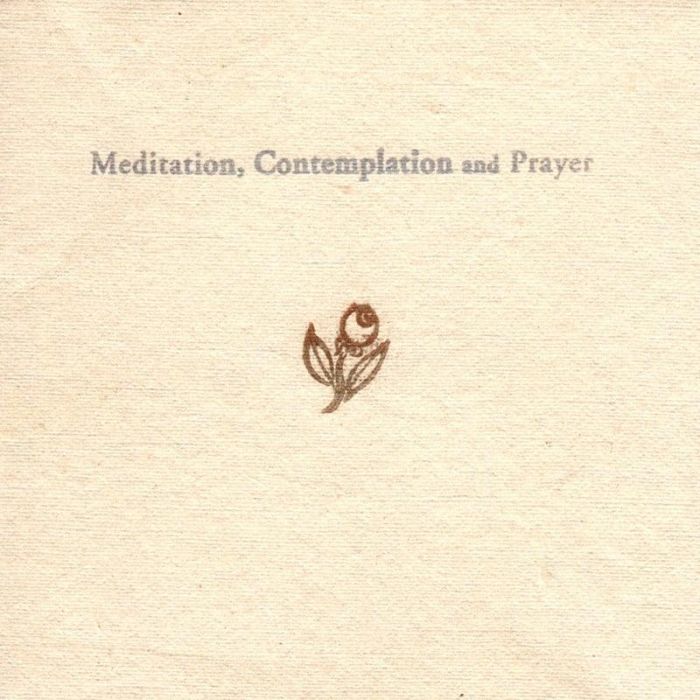Meditation, Contemplation, and Prayer by Jesse Eubanks (Review)

I recently attended my first Orthodox Church service a few weeks back, something I’d been meaning to do for quite some time. What immediately struck me was how processional and rigid it was, things completely at odds with the more Evangelical tradition that I’ve been brought up with. In fact, a few years ago I would’ve dismissed such a service as staid and old-fashioned, more concerned with tradition and ceremony than any sort of “real” spiritual experience.
But recently, I’ve come to respect the Orthodox tradition, to see that it offers a side of worship that Evangelicals don’t. The “modern” approach states that you can come to church, plop right down, and immediately enter into holy communion. There’s usually some token statement about leaving your concerns at the door, about giving them to God upon entering the Church, but precious little application. But, as Philip Yancey puts it, Orthodoxy seems to imply that “you do not approach the Other as you would your own kind.” The ritual helps you move “from a spirit of urgency and immediacy… to a place whose rhythms [are] the rhythms of eternity.”
I suspect that Jesse Eubanks had that concept in mind while recording Meditation, Contemplation, and Prayer. Considering the album’s worshipful, devotional leanings, it feels quite liturgical, albeit a liturgy of drones and feedback. Musically, Eubanks treads the same territory as Charity Empressa, especially with his forays into ethnic percussion and the like. While I confess that Charity Empressa’s music strikes me as richer and more satisfying on a sonic level, Eubanks’ efforts result in a far more intimate recording.
Unlike 99% of the worship CDs — which, for all intents and purposes, are full of watered down love songs — there is no pop appeal, no production sheen. When Eubanks’ quietly sings “I come to You/Broken and bruised/Wanting to be made new” against an ominous wall of pulsing guitar, the contrast has far more impact than most of the songs I hear on Sunday mornings these days. While some may find it hard to believe that music as formless as drone and psychedelia can have any sort of emotional affect apart from hallucinogenics, Eubanks’ emphasis on haunting atmospherics hints at those “rhythms of eternity” that Yancey mentions.
The sparse, reverbed guitar notes of “Matthew 11:28” are lovely enough, but it’s the steady background hum (glacial enough to set the surrounding world in slow motion) that helps the song relate to its scriptural reference. “Obscurity,” fittingly enough, takes a more ominous note than the preceding tracks. Similar in tone to Soulwhirlingsomewhere’s Eating the Sea, the slowly spiraling synths drip with sadness and regret, while darker, deeper drones threaten to envelope them.
Olga-Maria Cruz’ middle-eastern vocals paint “Consolation” with a more alien air, one that imagines ancient lines of pilgrims solemnly marching through sun-baked deserts and hazy mirages. Accompanying the vocals is Eubanks’ minimal e-bow work, and at any moment, you expect Dead Can Dance’s rhythms (à la Into the Labyrinth) to spring to life.
For the most part, the album maintains a consistent mood best suited for contemplative moments. As such, it sometimes barely registers, but stays quite comfortably in the background. But the mood does get broken in some places. The lyrics and vocals on “Nothing Can Separate Us,” as plaintive and inspiring as they are, are a bit abrupt in their appearance, especially since they follow the exotic “Consolation.” It doesn’t help that some of the lyrics also flow a bit awkwardly within the music’s context. And the solemn cello on “A Certain Place of the Soul” feels very awkward when run against the recording of an old timey fire and brimstone sermon. On nearly any other song, it would fit in quite beautifully, but here, the contrast is a bit too great.
The album ends on a gorgeous note, with the swirling organ and muted slide guitar of “Even to the End of the Age.” The tone here is one of peace and fulfillment, or possibly the light after a long dark night of the soul. From a drone standpoint, Eubanks never ventures to the extremes that Flying Saucer Attack do, nor is the sound as rough and lo-fi as early AMP. Again, the best comparison might be Charity Empressa. And though Eubanks never quite hits the same amount of sonic depth, his muted approach may lend itself better to more contemplative activities.